On a Friday night we drove to downtown Cleveland and watched Great Lakes Theater Festival’s (GLTF) Tempest.
Shakespeare’s play begins in medias res, on a ship in a storm at sea. GLTF’s sound designer Matt Webb provides crashes of thunder and scenic designer Efren Delgadillo, Jr. evokes the billowing seas with dyed parachute fabric that nearly spans the width of the stage.
The parachute fabric provides a surprisingly evocative moment when our romantic lead, Ferdinand, played by Domonique Champion, goes overboard and his movement in relation to the fabric shows him sinking into the ocean depths. (All photos by Ken Blaze.)
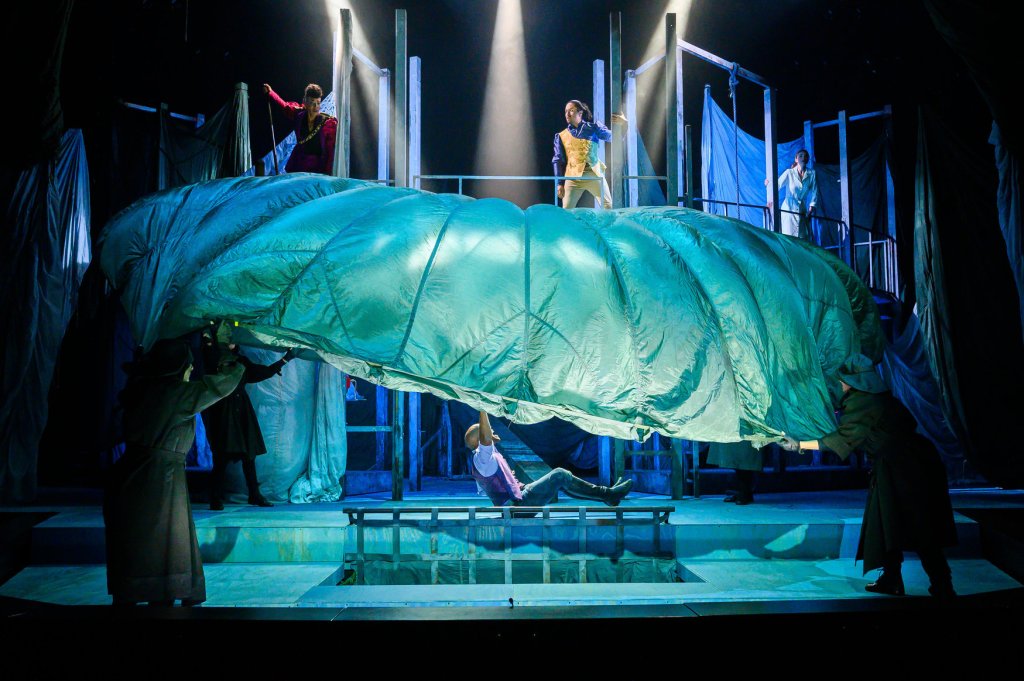
Beginning in the midst of things requires back story, which Shakespeare provides in the next scene. First, the magician Prospero (Aled Davies) explains to his daughter Miranda (Angela Utrera) how, when she was a toddler, he was the right Duke of Milan until his “perfidious” and “false” brother Antonio (a sneering, snarling David Anthony Smith) usurped his dukedom and cast them adrift at sea in a leaky boat. Prospero himself conjured up the storm in order to bring Antonio and other evil-doers to account, but don’t worry, Miranda.
The direful spectacle of the wreck, which touch’d
The very virtue of compassion in thee,
I have with such provision in mine art
So safely ordered that there is no soul –
No, not so much perdition as an hair
Betid to any creature in the vessel
Which thou heard’st cry, which thou saw’st sink.

Shakespeare provides more back story later in the same scene, bringing us up to speed on Ariel and Caliban. For now, though, let’s focus on Ferdinand wandering dazed on the beach later still in the same scene. Director Sara Bruner has recast many of the male roles as women so Ferdinand’s father, Alonso, King of Naples, has become Queen of Naples played by appropriately tall and regal Jessica D. Williams. And so, when Ariel, played by Joe Wegner, sings to Ferdinand telling him falsely that his father – ahem – mother is drowned, GLTF makes a necessary change in the text:
Full fathom five thy mother lies;
Of her bones are coral made;
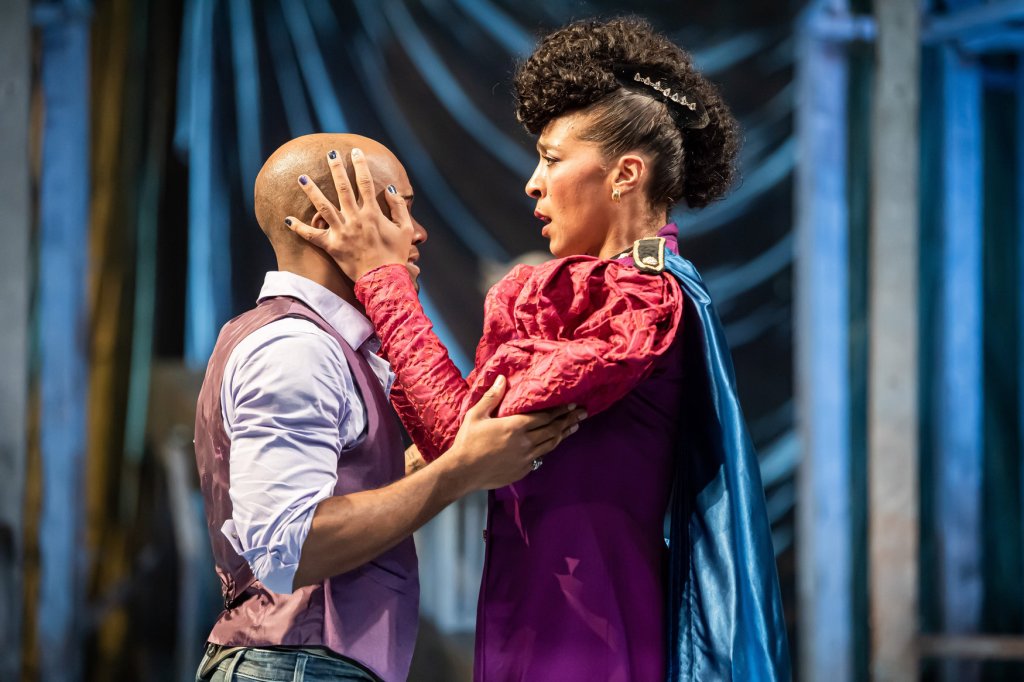
Ferdinand and Alonso each believe the other has drowned until they are reunited near the end of the play. Meanwhile, Miranda and Ferdinand see each other and instantly fall in love, thus setting up the most fortuitous of happy endings in which the heirs apparent of Naples and Milan will marry, uniting their realms. Domonique Champion’s Ferdinand bounces about the stage as he declares his love. Angela Utrera’s Miranda makes a more subtle transition from rational human to besmitten lover, changing her posture slightly, finding her hair permanently mussed, and unable to refrain from smiling at the sight of Ferdinand.

Before the happy ending, however, we must overcome Antonio, Prospero’s usurper brother, who is also on the island, plotting further evil with Sebastian, Jullian Remulla, who is Alonso’s evil brother. They are wandering about with Alonso and her suite when, after much banter, invisible Ariel puts all but Antonio and Sebastian to sleep. Never one to let an opportunity for evil slip away, Antonio persuades Sebastian that they should murder Alonso and her court while they sleep in order for Sebastian to usurp Naples as Antonio usurped Milan. Oh no! Fortunately, Ariel wakes everyone before Antonio and Sebastian can carry out their evil plan.
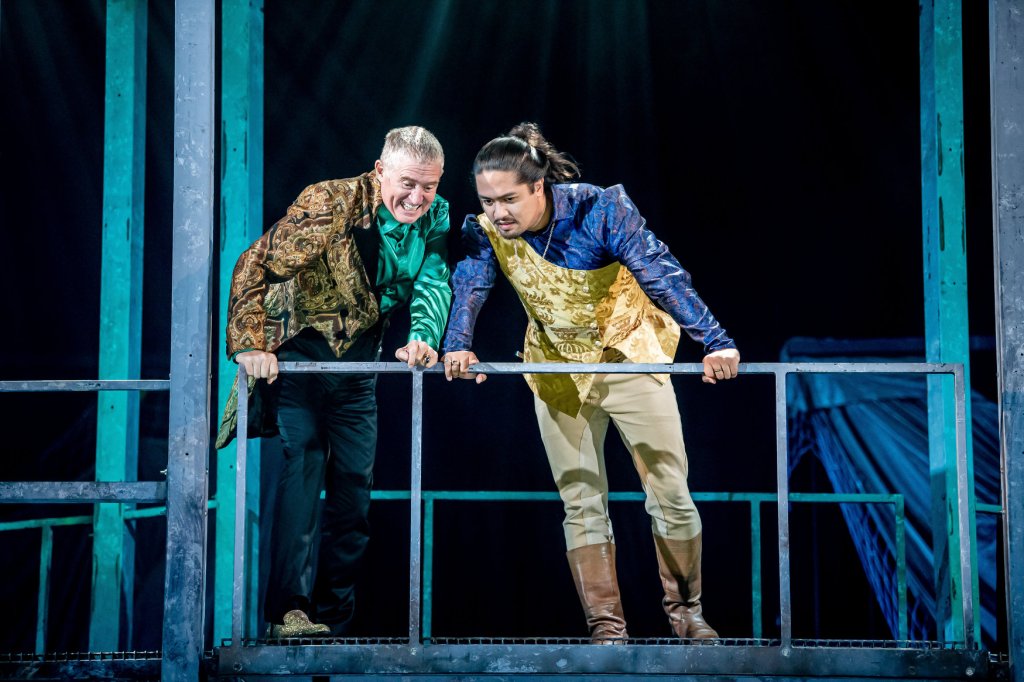
In addition to Queen Alonso, this GLTF production also recasts Trinculo, a Jester, and Stephano, a drunken Butler, as two very funny females in the GLTF company, Jodi Dominick and Jillian Kates. Drinking, applying cosmetics, adopting Caliban as a pet, and drinking some more, they reminded us of Jennifer Saunders and Joanna Lumley, those women-behaving-badly in Absolutely Fabulous. Soon Caliban has convinced them to help him assassinate Prospero, but their plan to stealthily enter Prospero’s cell is easily foiled when, with a screech, they come upon a wardrobe full of clothing. Naturally they have to stop and try everything on, and Prospero’s magic frightens them off.
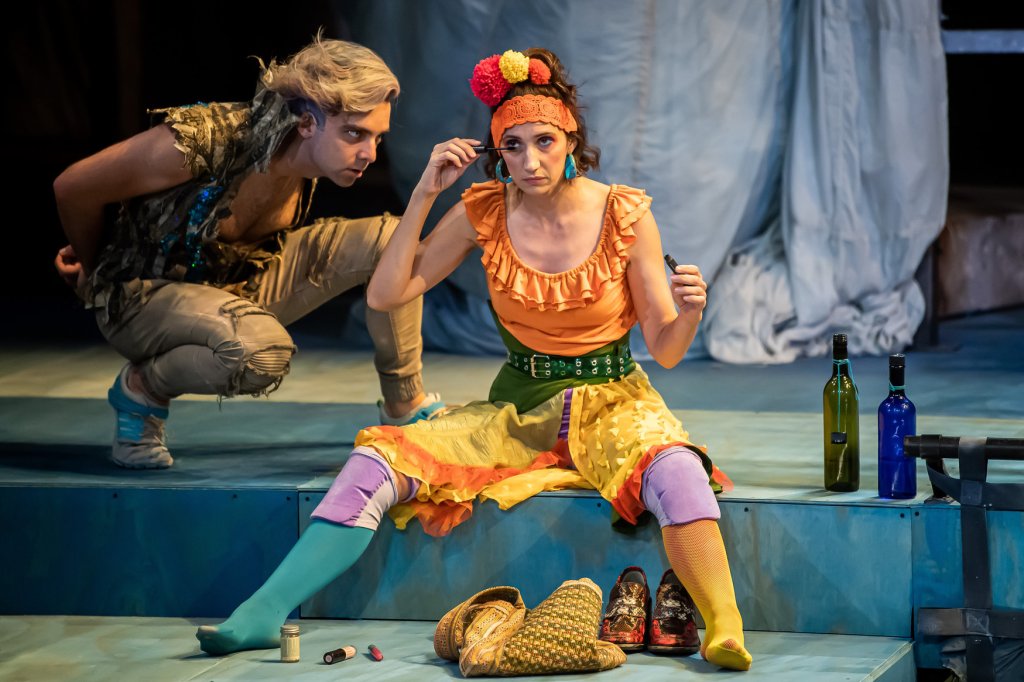
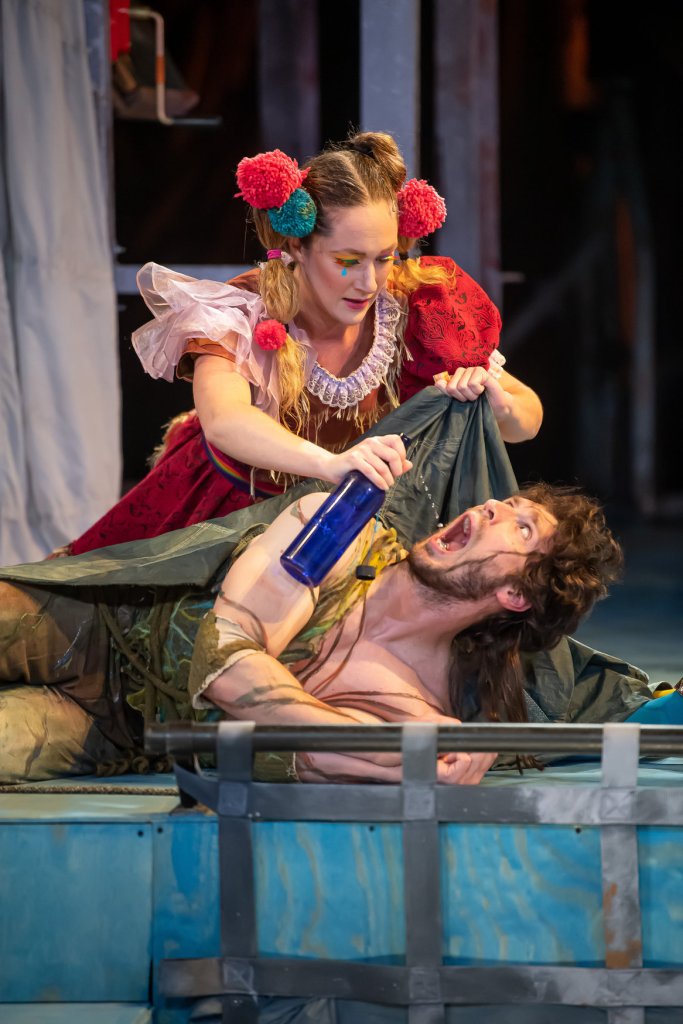
So, between Antonio, Sebastian, Trinculo, Stephano, and Caliban, there are plenty of evil-doers on Prospero’s island but Joe Wegner’s Ariel is always there walking invisibly among them, ready to thwart their evil plans with invincible magic, and conjuring in the process music, light shows on parachute fabric, and shadow pictures, all harking back to the court masques of Shakespeare’s time.
Besides the production values and the winding up and unwinding of the plot of Tempest, there’s something else we’d like to mention.
Maybe it’s just us. But ever since we read Shakespeare in a Divided America by James Shapiro we’ve been seeing and hearing Shakespeare in the light of America’s current political situation. With that in our minds, this production highlighted 3 moments in the text of the play that jumped out at us as they never have before.
For some years now, the critical literature has emphasized the very likely possibility that Shakespeare was thinking of the Americas when he wrote Tempest. This thesis begins with the strong possibility that an actual shipwreck in the New World, the wreck of Admiral George Somers’ ship Sea Venture, which the 150 aboard all survived, (George Somers – Wikipedia) was Shakespeare’s inspiration for Tempest. The dates of the wreck and the widely publicized letter from Somers describing it make it a plausible source for Tempest, which was probably written in late 1610 or early 1611, soon after Somers’ letter arrived in London.
If, indeed, Prospero’s island is inspired by the New World, then Ariel and especially Caliban would seem likely stand-ins for indigenous American peoples and enslaved Africans. Back in the late 1400’s and early 1500’s Columbus in the islands of the Carribean and the Portuguese in Brazil didn’t waste much time on religious conversion and exploration before they started exploiting the indigenous peoples and importing enslaved Africans, something Shakespeare surely knew about. Closer to Shakespeare’s time and place in history, in the early 1600’s, Shakespeare may well have seen and been influenced by reports on the English colony in Virginia, A True Declaration of the Estate of the Colony in Virginia, reports that arrived in England at just the right time to find their way into Shakespeare’s writing of Tempest.
What about the idea of the New World as a blank slate for a new social order and a new kind of government? Gonzalo proposes this thought in Act II, Scene I in order to distract Queen Alonso from the grievous possibility that her son Ferdinand was drowned in the shipwreck.
Had I plantation on this isle, my lord, —
And were the king on’t, what would I do?
It’s an idle thought experiment that even Gonzalo herself does not seem to take seriously, but where did Shakespeare get that idea? The answer, Dear Reader, is in your GLTF program note, which refers us to Michel De Montaigne’s essay On Cannibals, translated into English in 1603. In our translation of this essay, De Montaigne refers to indigenous Americans, among others, and opines:
“It seems to me that these peoples surpass not only the portraits which poetry has made of the Golden Age and all the invented, imaginary notions of the ideal state of humanity, but even the conceptions and the very aims of the philosophers themselves…
…It is a nation, I would tell Plato, in which there is no form of commerce, no knowledge of letters, no science of numbers, no name for magistrate or political superiors, no customs of servitude, or riches, or poverty, no contracts, no inheritance, no division of property, no occupations, other than leisure ones, no respect for kin relationships, except for common ties, no clothing, no agriculture, no metal, no use of wine or wheat. The very words which signify lying, treason, dissimulation, avarice, envy, slander, and forgiveness are unknown.”
Meanwhile, GLTF’s Lisa Tejero as Gonzalo says her lines as Shakespeare wrote them, and we are reminded how little effort Shakespeare made to conceal his sources:
“I’ th’ commonwealth I would by contraries
Execute all things; for no kind of traffic
Would I admit; no name of magistrate;
Letters should not be known; riches, poverty,
And use of service, none; contract, succession,
Bourn, bound of land, tilth, vineyard, none;
No use of metal, corn, or wine, or oil;
No occupation; all men idle, all;
And women too…
…I would with such perfection govern, sir,
T’ excel the golden age.”
Why not? We’re in a new world. But in the eyes of villains, this new world is fertile ground for slave labor. So, in Act V, looking at Caliban, the evil conspirators Sebastian and Antonio make light of his fishy smell and degraded condition.
Sebastian: Ha, ha!
What things are these, my lord Antonio?
Will money buy ‘em?
Antonio: Very like; one of them
Is a plain fish, and, no doubt, marketable.
Shakespeare surely intended this exchange as a throw away quip but, as GLT’s program notes point out, Caliban has long been seen as an apt symbol of enslaved Africans. Will money buy him? “No doubt marketable.”
For us, GLTF’s production gives a special weight to a moment very near the end of Act V, when Prospero sets Ariel free.
Prospero: [Aside to Ariel] My Ariel, chick,
That is thy charge. Then to the elements
Be free, and fare thou well!
In GLTF’s production, Joe Wegner’s hyperactive Ariel freezes and does a double-take on “free.” He appears to think it over. He’s been freed from bondage to Prospero, of course. But in the context of the brave new world of the Western hemisphere, “freedom” takes on a much more expansive meaning, a meaning well worth thinking over. What does it mean to be free? Ariel is a magical being, so the meaning of freedom for him is impossible for us to know. But what exactly is this “freedom” that we Americans speak about so glibly?

Covid vaccines are only part of it. The very meaning of the American project is the subject of intense debate in 2021, and a 400-year-old play puts that debate squarely before us.
We watched Great Lakes Theater Festival’s production of The Tempest by William Shakespeare on Friday, October 22, 2021 at the Hanna Theatre in Cleveland’s Playhouse Square. The production ran October 15 thru November 7.
Elsa Johnson and Victor Lucas
[…] Domonique Champion, this Claudio is no Forgettable Dude but, as we saw in GLT’s recent Tempest (A Tempest in America – Cleveland Concert Dance), a high bouncing lover of strangely believable […]
LikeLike